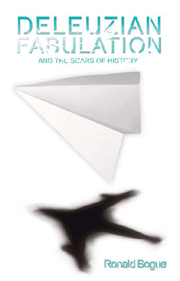Book contents
- Frontmatter
- Contents
- Acknowledgements
- Introduction
- 1 The Concept of Fabulation
- 2 Becoming-Prophet: Zakes Mda's The Heart of Redness
- 3 Becoming-Child, Becoming-Untouchable: Arundhati Roy's The God of Small Things
- 4 Becoming-Memory: Roberto Bolaño's Amulet
- 5 Becoming-Woman, Becoming-Girl: Assia Djebar's So Vast the Prison
- 6 Becoming-Fish: Richard Flanagan's Gould's Book of Fish
- Conclusion
- Bibliography
- Index
- Miscellaneous Endmatter
1 - The Concept of Fabulation
Published online by Cambridge University Press: 12 September 2012
- Frontmatter
- Contents
- Acknowledgements
- Introduction
- 1 The Concept of Fabulation
- 2 Becoming-Prophet: Zakes Mda's The Heart of Redness
- 3 Becoming-Child, Becoming-Untouchable: Arundhati Roy's The God of Small Things
- 4 Becoming-Memory: Roberto Bolaño's Amulet
- 5 Becoming-Woman, Becoming-Girl: Assia Djebar's So Vast the Prison
- 6 Becoming-Fish: Richard Flanagan's Gould's Book of Fish
- Conclusion
- Bibliography
- Index
- Miscellaneous Endmatter
Summary
In a 1990 interview, Deleuze observed that
It's the greatest artists (rather than populist artists) who invoke a people, and find they ‘lack a people’: Mallarmé, Rimbaud, Klee, Berg. The Straubs in cinema. Artists can only invoke a people, their need for one goes to the very heart of what they're doing, it's not their job to create one, and they can't. … How is a people created, through what terrible suffering? When a people's created, it's through its own resources, but in a way that links up with something in art (Garrel says there's a mass of terrible suffering in the Louvre, too) or links up art to what it lacked. Utopia isn't the right concept: it's more a question of a ‘fabulation’ in which a people and art both share. We ought to take up Bergson's notion of fabulation and give it a political meaning. (Deleuze 1995: 174)
Although Deleuze proposes here to develop a political conception of Bergsonian fabulation, he was able to offer only cursory intimations of what such an idea might be before his death in 1995. Nonetheless, these hints are sufficient to suggest what he meant by fabulation and how the concept might be situated within his thought as a whole.
Bergsonian Fabulation
Even in French, the word ‘fabulation’ is somewhat rare, and according to the Robert Dictionnaire, Bergson is the first to use the word in a philosophical sense (which the Dictionnaire defines as an ‘activity of the imagination’).
- Type
- Chapter
- Information
- Deleuzian Fabulation and the Scars of History , pp. 14 - 48Publisher: Edinburgh University PressPrint publication year: 2010



